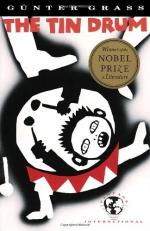|
|
The Tin Drum Chapter 35: Firestones and Tombstones
In Düsseldorf, Oskar, Maria, and Kurt take up with Maria's sister Guste Truczinski. Guste had married a soldier named Köster, who was shipped to the Arctic front soon after they had met. He was reported to be a prisoner in Russia, and Guste forever clung to the hope that he would come back.
When Oskar was discharged from the hospital, he came to Guste's apartment and found Kurt and Maria dealing in the black market. Maria, just as Matzerath always had, dealt in synthetic honey. Oskar was put to work weighing and making up packages of honey in Guste's kitchen. Six-year-old Kurt was busy adding up figures - he'd been to six weeks of school and was already an entrepreneur. Guste drank coffee and stroked Oskar's newly grown hump - she thought it was good luck. She frowned on the black market dealings.
Kurt started dealing in flints and dealing shrewdly with his customers. He had a flint monopoly; no one knew where he got them, he said only that he had a " source." Oskar would roar at Kurt for him to tell his source, but Kurt never told and it made Maria indignant - she would get angry because Oskar did nothing to help the family earn money. Oskar began taking the pocket money Kurt gave him and leaving all day long to avoid the shame of not making money. Oskar became interested in adult education, and spent time at the British Center engaging in long discussions on religion. He began to read and go to the theater avidly, but did not become cultured. His binge, Oskar says, was followed by a hangover - in the spring of 1947 he abandoned it all.
It had not been two years since Matzerath had died; already Oskar was tired of being a grownup. He longed for his drum and to be three feet tall. Oskar took to visiting the City Hospital; the nurses almost made him happy with their gossip. Oskar wished to make a "conquest" of one of the nurses, but without his drum he was unsure of his potency. Oskar would walk through cemeteries during this time:
"Cemeteries have always had a lure for me. They are well kept, free from ambiguity, logical, virile, and alive. In cemeteries you can summon up courage and arrive at decisions, in cemeteries life takes on distinct contours - I am not referring to the borders of the graves - and, if you will, a meaning." Chapter 35, pg. 438
Along the border of the Western Cemetery, there were six manufacturers of tombstones. Oskar loitered outside a shop owned by one P. Korneff. When the man came outside to rake the gravel on his doorstep, Oskar noticed he was painfully skinny and old. He walked with a stoop. The back of his neck was covered with pink adhesive tape, which covered a crop of erupting boils. Oskar asked to see the shop, then when Korneff mentioned it, inquired about being taken on as an apprentice. Korneff replied that it was hard work; Oskar had better think it over, but he would take him on. After a week of putting up with the guilt and shame Maria poured on him, Oskar went and retrieved the ruby necklace that he and Jan Bronski had once stolen for Agnes. He took a streetcar to Central Station and traded the necklace for a real leather briefcase and twelve cartons of Lucky Strike cigarettes. Oskar went back to Guste's apartment and gave Maria, Kurt, and Guste the cigarettes - a virtual fortune. He told them the only condition on the gift was that that they would leave him alone, and give him a lunch to take with him each morning; he was going to begin to inscribe tombstones.
Oskar worked for Korneff for a hundred Reichmarks a month. He was too weak for the heavy chiseling work, but he excelled at the fine work - scalloping and finishing borders. Against Korneff's wishes, Oskar chiseled left-handed. Oskar was finally happy in his work. Before long, Oskar could outdo Korneff at the inscriptions and was put in charge of all ornamental work. Oskar was particularly fond of inscribing O's; they tended to be too large. Finally, the following October, Oskar was allowed to help Korneff put up a tombstone. Korneff had doubted Oskar's strength and had always enlisted outside help for the job. On the way, Oskar saw Sister Gertrude, a nurse he knew, and resolved to ask her out. When they reached the entrance to the cemetery, Oskar says that Leo Schugger was standing there. Korneff said he didn't know a Leo Schugger; the man's name was Willem Slobber. Korneff says he knows a whole fleet of men just like Slobber and Schugger who live in different cemeteries.
In the cemetery Korneff complained about the two boils on the back of his neck as they dug the hole for the tombstone. He said they were about to burst; he could always tell. A funeral procession wound past them; Oskar climbed on Korneff's back and pulled the heads off the boils as the funeral procession prayed - Korneff recited the Lord's Prayer with them as Oskar squeezed.




